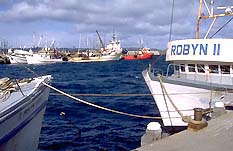Who Are These People
(Out of Eden)
For The workers at The Eden Cannery
Words and Music Pat
Drummond and Craig Dawson
Dateline: Eden, NSW
 In July 1999, after
50 years of operation, Heinz Watties closed the Eden Tuna cannery,
which employed a large percentage of the local workers.
What made this action
doubly callous and insensitive , however, was that the cannery
had already faced the axe in the early nineties. At that time,
however, the locals formed a group called the Workers of Greenseas.
Taking on an environmentally freindly image they promoted their
product as being dolphin free and the workers developed a range
of flavoured tuna products that was to become phenomenally successful
for Heinz, The 'Tastetempters' line'
All of this made the
cannery more than profitable again, turning an annual profit of
$8 million dollars for the global giant. By 1999 the Eden cannery
was processing about 4,500 tonnes of product a year; not big by
world standards but more than enough to support the coastal village
and be a shining example as to how, with innovation and dedication,
Australians could hold their own in a changing world. It should
have been a recipe for a grateful response from Heinz.
But while the workers
had made the cannery profitable again, they didn't make it profitable
enough for Heinz Watties, the owner of the Greenseas label, who
nonetheless decided in 1999 to close it down, sack the workers
who had come up with the 'Tastetempters' idea and move much of
the operation to Thailand where they could pay slave labour rates.
They then began to ship the product back back to sell in the Australian
market.
One of the women workers
affected Helen Pickard said to the ABC at the time " We brought
out the tempters, the flavoured tuna, and that was to get the
place up and running, so we didn't lose it. And it's been running
flat-out ever since, and now they've just turned around and said
that we're not globally competitive. I'd like to know when that
stopped, We only supplied the Australian market anyway, we didn't
export. But the Australian public bought our product and that's
what kept us going."
In July 1999, after
50 years of operation, Heinz Watties closed the Eden Tuna cannery,
which employed a large percentage of the local workers.
What made this action
doubly callous and insensitive , however, was that the cannery
had already faced the axe in the early nineties. At that time,
however, the locals formed a group called the Workers of Greenseas.
Taking on an environmentally freindly image they promoted their
product as being dolphin free and the workers developed a range
of flavoured tuna products that was to become phenomenally successful
for Heinz, The 'Tastetempters' line'
All of this made the
cannery more than profitable again, turning an annual profit of
$8 million dollars for the global giant. By 1999 the Eden cannery
was processing about 4,500 tonnes of product a year; not big by
world standards but more than enough to support the coastal village
and be a shining example as to how, with innovation and dedication,
Australians could hold their own in a changing world. It should
have been a recipe for a grateful response from Heinz.
But while the workers
had made the cannery profitable again, they didn't make it profitable
enough for Heinz Watties, the owner of the Greenseas label, who
nonetheless decided in 1999 to close it down, sack the workers
who had come up with the 'Tastetempters' idea and move much of
the operation to Thailand where they could pay slave labour rates.
They then began to ship the product back back to sell in the Australian
market.
One of the women workers
affected Helen Pickard said to the ABC at the time " We brought
out the tempters, the flavoured tuna, and that was to get the
place up and running, so we didn't lose it. And it's been running
flat-out ever since, and now they've just turned around and said
that we're not globally competitive. I'd like to know when that
stopped, We only supplied the Australian market anyway, we didn't
export. But the Australian public bought our product and that's
what kept us going."
Less and less of us are however
prepared to put up with the transparently rapacious tactics of
such multinationals and many Australians now, quite properly in
my opinion, refuse to buy Heinz products. In the NSW south coast
town of Eden, one in every eight workers lost their jobs.
Globalisation could be a great
benefit to all but, as it is often practised, it is just an excuse
for multinationals to return to ther 'robber baron' days and to
access labour under conditions that the civilised world abolished
a century ago. Even worse these companies then seek to use that
economic lever to reduce the standards of living for workers in
developed countries like Australia.
I am absolutely committed to
the proposition that Free trade agreements must be tied to minimum
standards of working conditions and that those companies who refuse
to operate under such humane standards should be banned from importing
their products into our markets.
Back
to Lyric /
Chess Set Homepage / The
Age Of Dissent / The
Descent Of Age